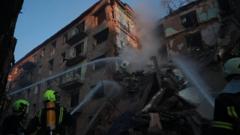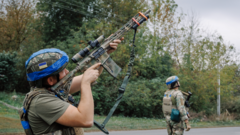This NATO summit, described as potentially the most significant since the Cold War, will test US-European alliances under President Trump's re-elected administration.
**NATO Summit: A Pivotal Moment in Global Security Dynamics**

**NATO Summit: A Pivotal Moment in Global Security Dynamics**
As the US weighs military engagements, leaders gather in the Netherlands amidst rising geopolitical tensions.
The impending NATO summit in the Netherlands comes at a time of heightened global tension, particularly following US military actions against Iran. President Trump’s attendance at this meeting, his first since being re-elected, holds immense implications for NATO relations, especially as his previous criticisms of European allies' defense spending echo loudly.
European nations are now scrambling to reassure Trump of their commitment to NATO, a move that follows a fraught period strained by trade tariffs and military responsibilities. One anonymous diplomat remarked on the precariousness of whether Trump would show up, given the escalating situation with Iran and concerns over Western unity in the face of threats from Russia and China.
NATO Secretary General Mark Rutte is aiming to navigate this summit carefully, attempting to placate Trump with promising defense spending commitments from member nations. This approach highlights a strategic pivot towards defense responsibility for European countries, which have often leaned on US military support. The crux of the discussions will likely revolve around increasing defense spending to meet Trump's expectations and the perceived need for enhanced military readiness in Europe.
Nevertheless, the prospect of discussing the Middle East conflict, particularly Iran’s response to US actions, looms over the summit. It raises the likelihood of potential tensions between Trump and European leaders who favor diplomatic solutions over military intervention.
The proposed defense spending hike, set to reach 5% of GDP, faces skepticism from several member states, with countries like Spain seeking exemptions from this substantial financial commitment. As European nations weigh their own security needs against Trump’s demands, the question of financial viability becomes crucial, notwithstanding the possible backlash from domestic politics.
Indeed, European leaders have long been warned about the necessity for self-sufficiency in defense, particularly as the balance of power shifts. Trump's administration has made it clear that US military focus may increasingly pivot towards the Indo-Pacific region, depending on the evolving dynamics in Asia.
While discussions about NATO’s collective defense framework and strategic priorities unfold, the uncertainty surrounding US commitments continues to overshadow the alliance. For European leaders, particularly those close to potential threats like Poland, ensuring a robust military posture has become an existential priority.
In summary, this NATO summit not only signifies a test of transatlantic relationships but also represents a critical juncture in Europe’s defense strategy as it grapples with the implications of US foreign policy under Trump. As regional security dilemmas play out, leaders must reconcile national interests with collective responsibilities, posing profound questions about the future of NATO and European security autonomy.
European nations are now scrambling to reassure Trump of their commitment to NATO, a move that follows a fraught period strained by trade tariffs and military responsibilities. One anonymous diplomat remarked on the precariousness of whether Trump would show up, given the escalating situation with Iran and concerns over Western unity in the face of threats from Russia and China.
NATO Secretary General Mark Rutte is aiming to navigate this summit carefully, attempting to placate Trump with promising defense spending commitments from member nations. This approach highlights a strategic pivot towards defense responsibility for European countries, which have often leaned on US military support. The crux of the discussions will likely revolve around increasing defense spending to meet Trump's expectations and the perceived need for enhanced military readiness in Europe.
Nevertheless, the prospect of discussing the Middle East conflict, particularly Iran’s response to US actions, looms over the summit. It raises the likelihood of potential tensions between Trump and European leaders who favor diplomatic solutions over military intervention.
The proposed defense spending hike, set to reach 5% of GDP, faces skepticism from several member states, with countries like Spain seeking exemptions from this substantial financial commitment. As European nations weigh their own security needs against Trump’s demands, the question of financial viability becomes crucial, notwithstanding the possible backlash from domestic politics.
Indeed, European leaders have long been warned about the necessity for self-sufficiency in defense, particularly as the balance of power shifts. Trump's administration has made it clear that US military focus may increasingly pivot towards the Indo-Pacific region, depending on the evolving dynamics in Asia.
While discussions about NATO’s collective defense framework and strategic priorities unfold, the uncertainty surrounding US commitments continues to overshadow the alliance. For European leaders, particularly those close to potential threats like Poland, ensuring a robust military posture has become an existential priority.
In summary, this NATO summit not only signifies a test of transatlantic relationships but also represents a critical juncture in Europe’s defense strategy as it grapples with the implications of US foreign policy under Trump. As regional security dilemmas play out, leaders must reconcile national interests with collective responsibilities, posing profound questions about the future of NATO and European security autonomy.





















